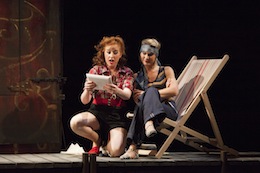Mozart’s Così fan tutte (“All women are like that”) has been denounced and praised by critics in equal measure. The Romantics condemned the amoral tale of two officers consciously leading their respective beloveds astray by seducing the other’s fiancée (not to mention the implausibility of the two sisters not recognising each other’s partner, heavily disguised as they might be), while more recently Peter Kivy recommended treating the opera as a “sinfonia concertante”, an orchestral piece in which different soloists temporarily come to the fore individually or in groups, and once all possible combinations are exhausted (i.e. each soloist had an aria, a duet, a trio, etc. with everyone else) the piece is over – never mind the plot. Yet the genre of 'demonstration comedy' in which human conditions like love were examined in quasi-laboratory conditions was well-known in the eighteenth century. Mozart and his librettist da Ponte thus provided a playful variation of a common theme that – in more serious guises – was continued well into the 20th century, for example by the Spanish philosopher Ortega y Gasset in his essay On Love.
Orpha Phelan’s new production for Opera Theatre Company has the action starting in a fairground where the two officers Ferrando and Guglielmo visit 'The Magical Emporium of Dottore Alfonso', a fortune-teller’s cart revealing its magical properties foremost in its ability to present a completely different set each time its doors open. (Designer Madeleine Boyd uses a very small space quite imaginatively to create the different rooms while Aedín Cosgrove’s equally creative lighting indicates different spaces outside during the transitional scenes when the cart’s doors are closed.)
.jpg.aspx%3Fwidth=260&height=173)
Don Alfonso strikes a bet with the two friends, assuring them that their beloveds will prove to be incapable of being faithful, just like all other women. There are clear misogynistic undertones in the libretto – like the Duke of Mantua in Rigoletto, Guglielmo will later sing of the fickleness of women, yet both fail to realise that in each case the men are the driving forces behind the action, and that active seduction (under whichever pretence) represents just as much unfaithfulness (and a higher degree of moral failure) than the more passive giving-in. The bet (of €10,000) is accepted, the friends leave their women behind to “go to war” and return disguised as “Albanians” to test their beloveds’ steadfastness.
Phelan’s two seducers sometimes strike the viewer as a modern, equally clumsy version of Laurel and Hardy, particularly when ostensibly poisoning themselves due to unrequited love at the end of the first act and being healed by the application of a big magnet (a pun at the expense of the then famous magnetic therapist Franz Anton Mesmer, an acquaintance of Mozart immortalised in the verb “mesmerise”). Despina’s appearances as cross-dressed doctor and notary fall into the same slapstick category; Colette Delahunt clearly relishes the part of a chambermaid suddenly shaping the fate of those she normally serves when becoming Alfonso’s right-hand woman. Mairéad Buicke provides the strong-willed and short- tempered Fiordiligi with explosive vocal power, most convincingly in her initial rejection of the new partner advocated by just about everyone around her. Martha Bredin sings Dorabella with a less powerful but much more controlled voice, shaping her part with subtle trills, swells and other ornaments indicating the playfulness of the sister who gives in to the Albanians’ advances first. Sune Hjerrild and Owen Gilhooly provide Ferrando and Guglielmo with the vocal versatility required for these roles, equally convincing in their initial confidence in their fiancées, their short-lived later triumph when successfully seducing the respective other sister, followed by the devastating realisation of what that means for their own relationship.
tempered Fiordiligi with explosive vocal power, most convincingly in her initial rejection of the new partner advocated by just about everyone around her. Martha Bredin sings Dorabella with a less powerful but much more controlled voice, shaping her part with subtle trills, swells and other ornaments indicating the playfulness of the sister who gives in to the Albanians’ advances first. Sune Hjerrild and Owen Gilhooly provide Ferrando and Guglielmo with the vocal versatility required for these roles, equally convincing in their initial confidence in their fiancées, their short-lived later triumph when successfully seducing the respective other sister, followed by the devastating realisation of what that means for their own relationship.
The part of the elderly Don Alfonso – less virtuosic than that of other protagonists – is often given to singers deep in the second half of their career and with their powers in decline. The younger, more energetic Simon Wilding is a very good choice for this production. His Alfonso loves manipulating people, controls every detail of the action and seems to be motivated by much more than just the money at stake. (It has been suggested that he is like a former Cherubino and Don Giovanni grown old; he has seen it all and lost any ideal or illusion he may once have believed in.) Wilding’s voice particularly shines in the second act, when the action moves from Alfonso’s cart to a seaside pier.
The orchestra – reduced to flute, oboe, clarinet, bassoon, cello and piano and led by Andrew Griffiths – appears not strong enough in the overture when one misses the full orchestral sound, yet later proves an able and well-balanced counterpart for the singers (the choruses are left out in this production). In the end Don Alfonso has won his bet; he convinces the disillusioned quartet to marry their original partners regardless, and Orpha Phelan has the party departing in a coach (the former pier) into a rather uncertain future.
Wolfgang Marx